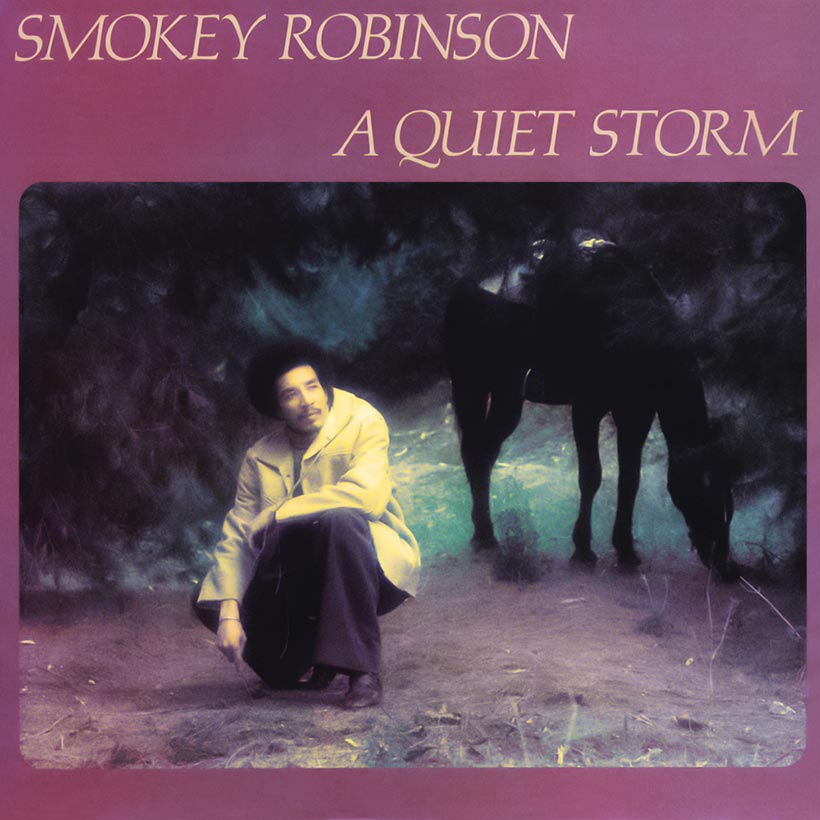There are examples of records that gave a name to a whole genre (like “Rapper’s Delight,” which used the term “hip-hop” on wax for the first time), and even a sound system that gave birth to a record label and a style of music, such as Rockers. But there aren’t many records that gave a name and musical outlook to an entire programming format for radio – and one that has thrived for more than four decades. Welcome to the show, ladies and gentlemen. Tonight we are going to play it smooth, black, and gently funky; low, slow, and slinky for all-grown-up listeners who still have soul. So pour yourself something nice, turn the lights down, and get ready to be immersed in Smokey Robinson‘s A Quiet Storm.
Listen to A Quiet Storm on Apple Music and Spotify.
Lost in its intimate life
A Quiet Storm was Smokey’s third solo album, released on March 26, 1975, and by far and away his best to that point. The first two were not without their moments, but it seemed as if Smokey was reaching for a style that only really coalesced here. The mature singer-songwriter chiefly concerned with relationship issues was a successful musical trope of the first half of the 70s, and while Motown had tried to nurture such a figure before, particularly in the two Valerie Simpson albums they released, Smokey Robinson was the artist equipped for the role. Opening with an arresting synthesized storm effect and an irresistible bassline, the title track is close-miked, and the breathy quality of his voice was never caught better on record. The beat of the song is barely apparent – we are miles from Motown’s original trademark crashing snare here – but still, you find yourself rocking to its subtle groove. Getting on for eight minutes later, you are still lost in its intimate life.
“The Agony And The Ecstasy,” a “Me And Mrs. Jones”-type tale of infidelity, but with a more thoughtful lyric, boasts ringing guitar parts from former Miracle Marv Tarplin and a lush, languid feel as Smokey endures what fellow adult soulsters would later simply term “Joy And Pain.” “Baby That’s Backatcha” focuses more on a funky sound, but this US Top 30 single is hardly grits and growling: threaded with a strand of flute, this is as sweet as club funk ever got; mellow-mellow, right on. “Wedding Song,” written for the 1973 nuptials of Jermaine Jackson and Hazel, the daughter of Motown boss Berry Gordy, mostly sidesteps sickly sentiment, telling of the most important day of many people’s lives with sincere optimism.
Soulful, absorbing, life-affirming
Smokey Robinson could have been accused of over-optimism when he wrote ʻHappy (Love Theme From Lady Sings The Blues),” basing it on Michel Legrand’s theme from the movie – but not until after the movie had been completed, reputedly to Berry Gordy’s chagrin as he was highly impressed with the song. No matter; Michael Jackson recorded it, and the song found the perfect home on A Quiet Storm, where it had space to spread out over seven minutes.
“Love Letters,” dripping with synth from bass to the piccolo-like trebly whistle, is the album’s least-satisfying cut, a muted funk that sounds like it was assembled as much as written, despite Smokey’s apparently confessional lyric that declares his life has been a love letter – which, in terms of his writing career, was correct. Tarplin hits a rare snagged note in the intro, a sure sign that this was not as finished as it might have been, though we are far more used to sophisticated synth music now than the world was in ’75 when “Love Letters” represented something fresh and intriguing.
The uptempo closer, “Coincidentally,” a tale of romantic dissatisfaction which would have perfectly suited the late-60s Miracles, is far more accomplished, with burbling, boiling clavinet and buoyant electric piano supporting Smokey’s irritated, dismissive, even vengeful lyric. The album ends with a brief reprise of the title track over the synthesizer that has filled the gaps between each song.
Like most great albums, A Quiet Storm occupies a world of its own making: a warm, sometimes steamy world, but not a world without its drawbacks. If this is love, it’s not a gooey, cloying one, but the flawed one all relationships have to endure. This is love for adults, not starry-eyed, smitten teens. The storm of the title is not only romantic passion but the difficulties of romance amid life’s struggles. Smokey Robinson evokes this convincingly because he does it with utter conviction.
Soulful, absorbing, life-affirming, and every bit as moving as the best of his work with The Miracles and beyond, A Quiet Storm is one of the landmark soul albums of its era – and its innovations continue to resonate.
A Quiet Storm can be bought here.



